Learn more about leading a climate game
- Overview
Engage people in climate action with one of the climate games below. The games offer tailored guidance for fun, interactive activities, taking into account the event location, group size, and participants' ages.
- Objectives
Engage different audiences by setting up activities that grab people's attention and can be carried out in a short amount of time, including in crowded and busy settings such as festivals, exhibitions or outdoor events. Initiate discussions on climate topics and opportunities for individual climate action in a non-judgemental, fun and explorative way.
- Target group
General public. The activities can be used with a wide variety of target groups, such as school groups, seniors, company employees, climate activists, neighbours and others.
- Requirements
Games can be tailored according to the group size and age range. Each game has its own individual requirements, please check them below.
Climate Games in action

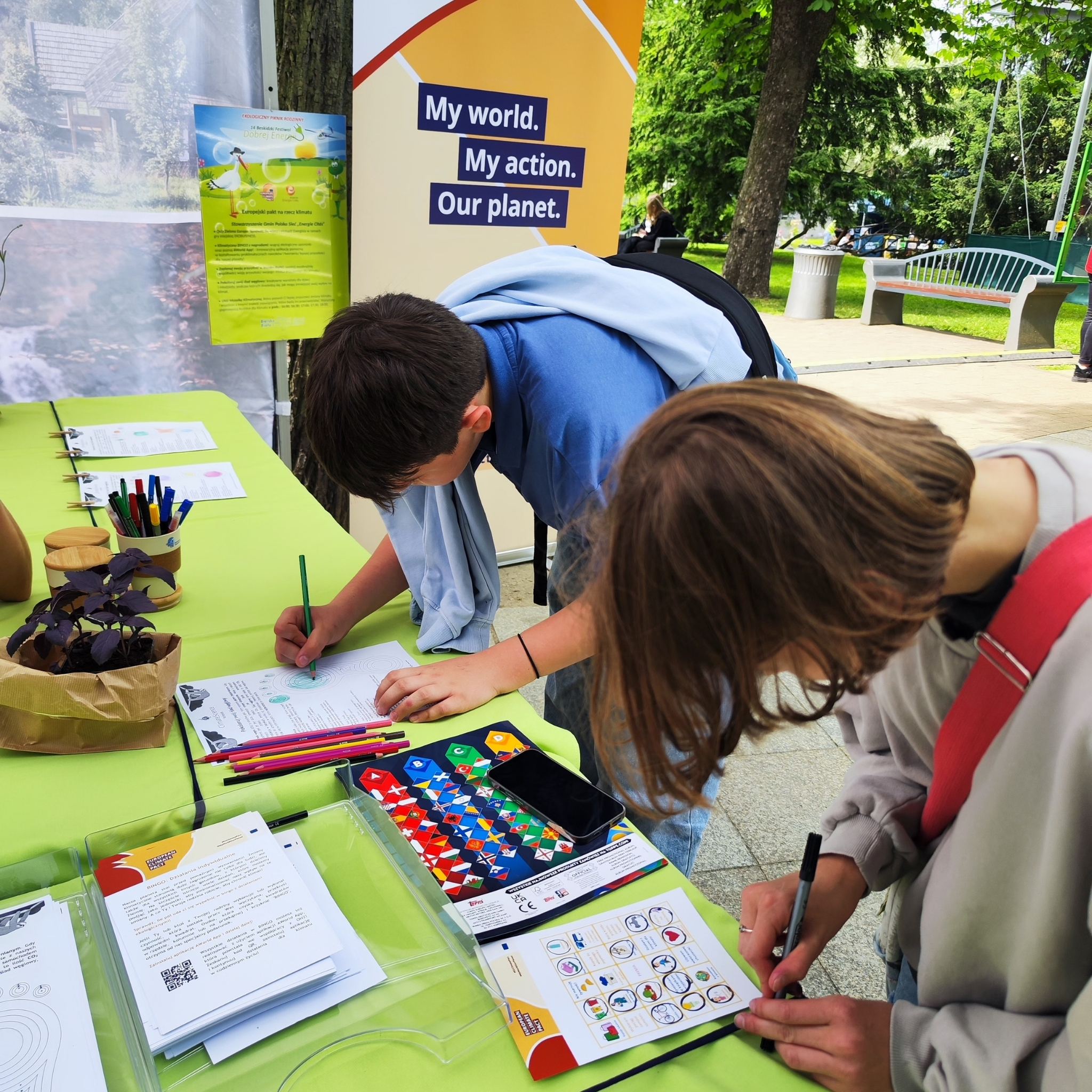
Playing Climate Bingo at the Citizen Engagement Beskids' Good Energy Festival, Poland, May 2024Playing Climate Bingo at the Citizen Engagement Beskids' Good Energy Festival, Poland, May 2024 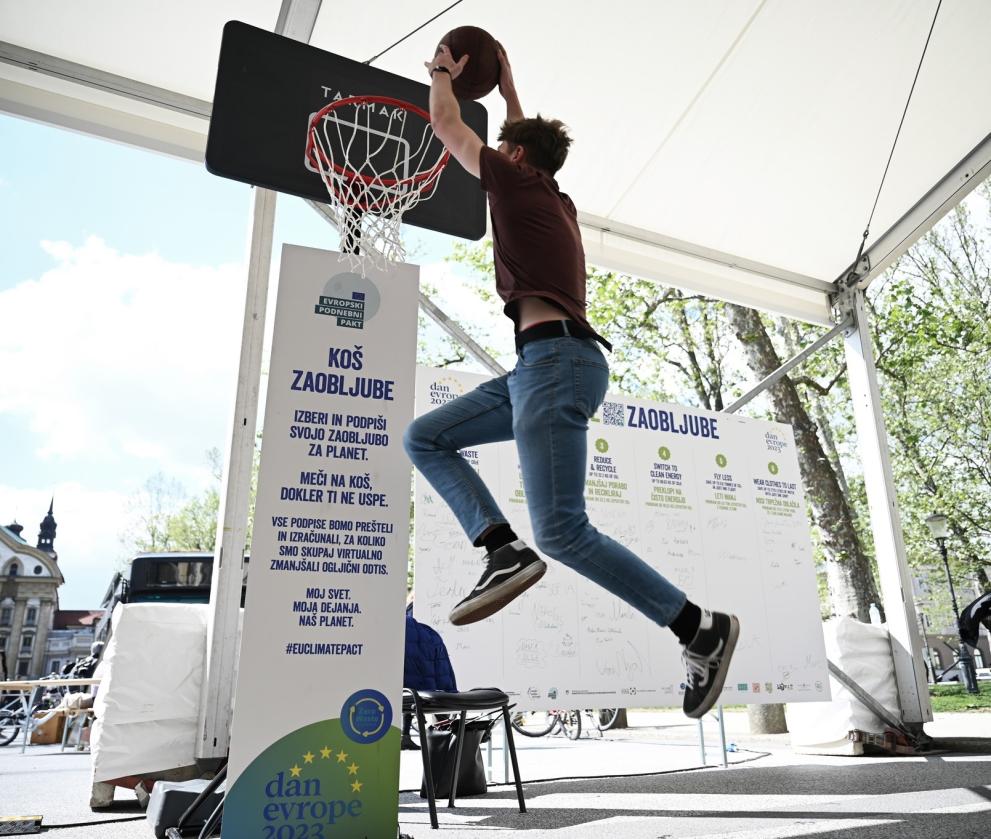
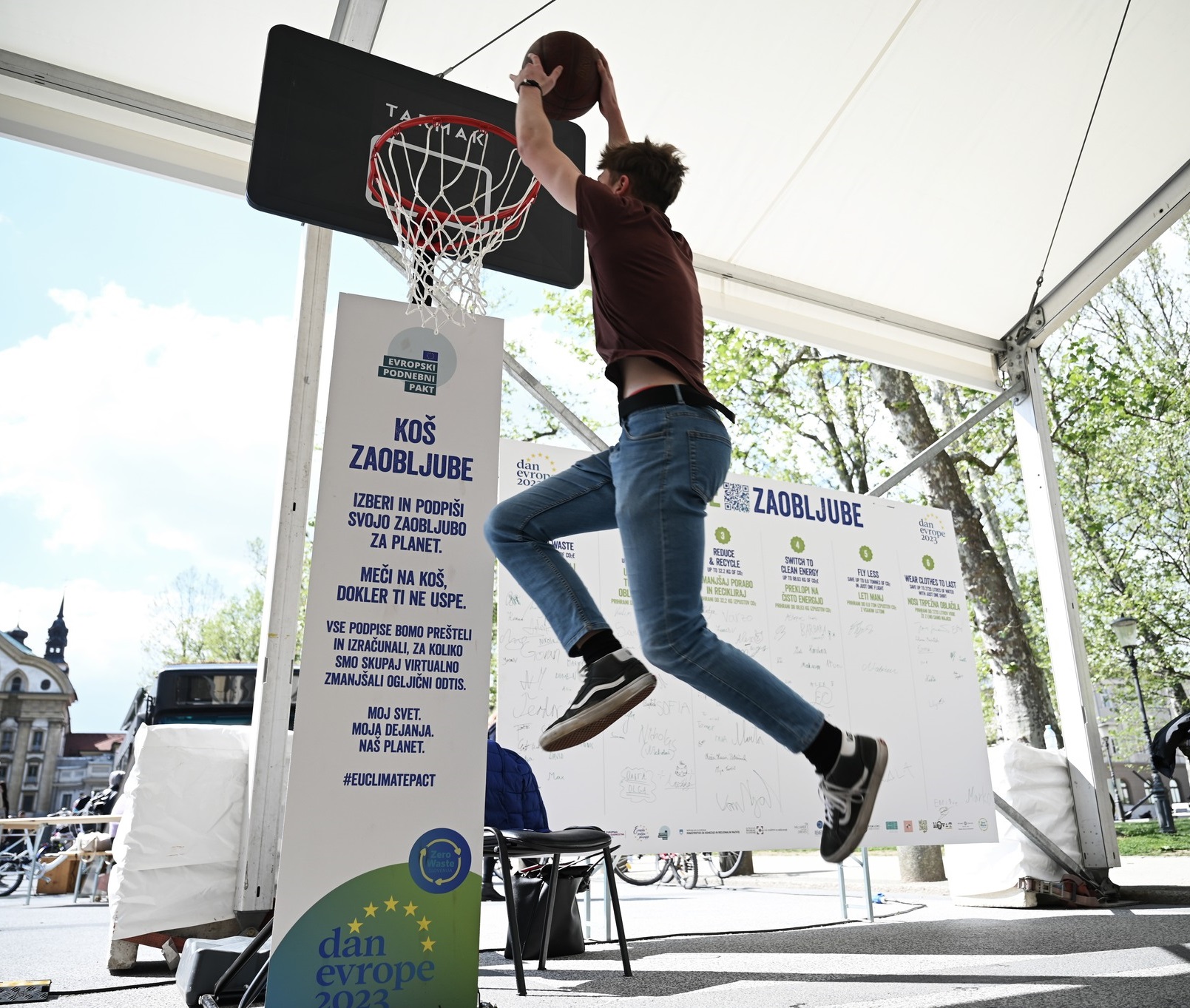
Flying for a basketball slam dunk before taking a climate action pledge at the Europe Day, Slovenia, 10 May, 2024Flying for a basketball slam dunk before taking a climate action pledge at the Europe Day, Slovenia, 10 May, 2024 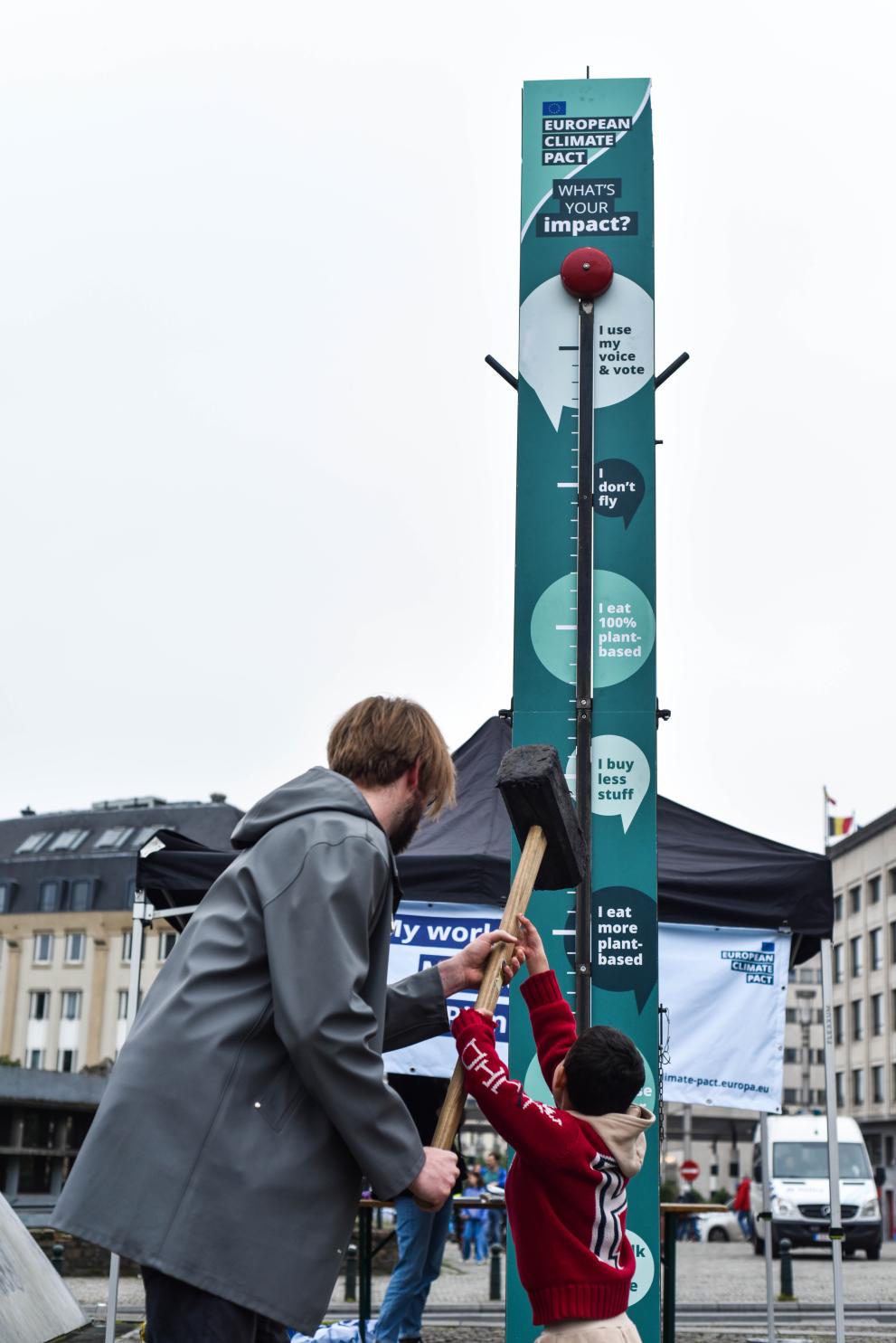
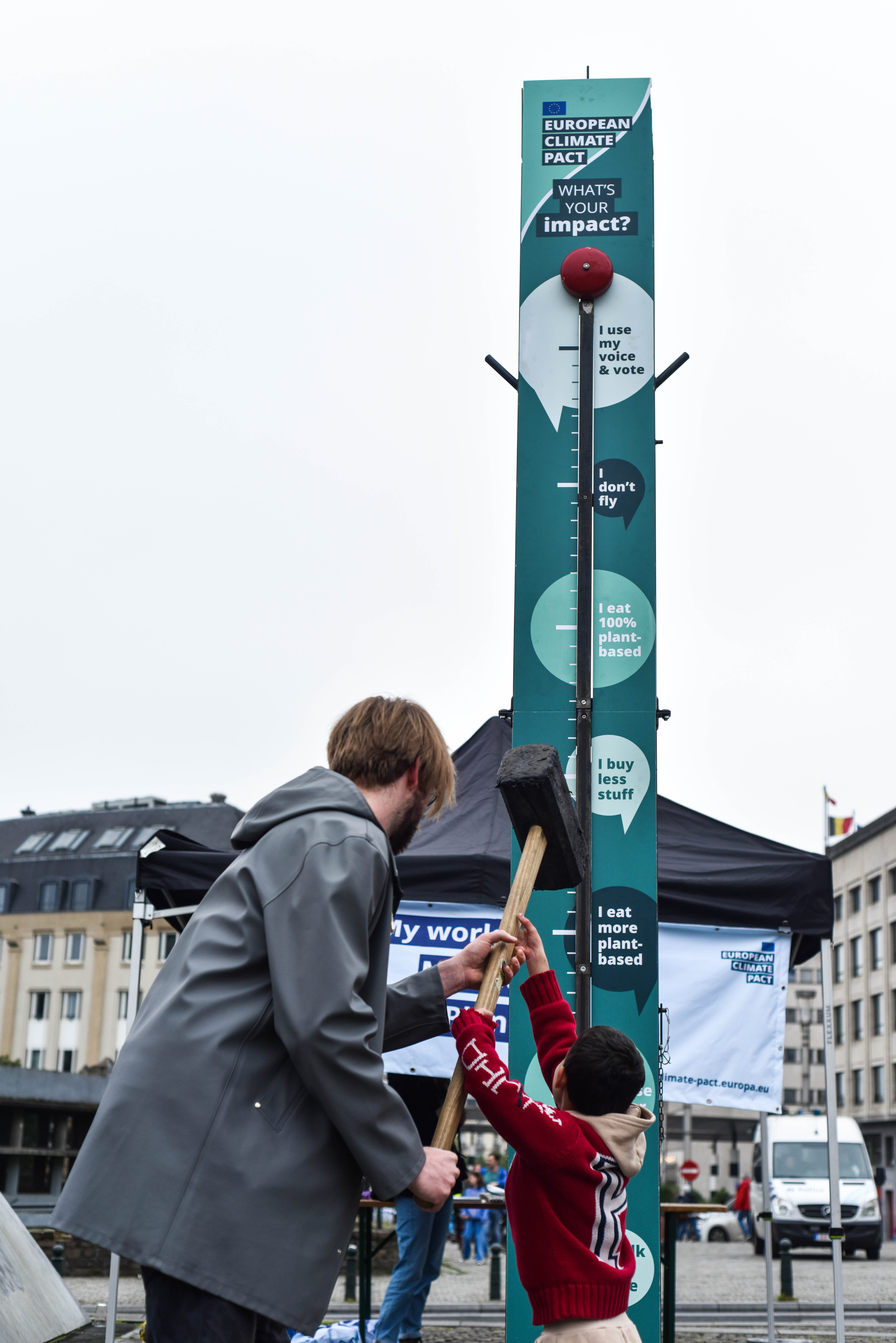
“Making an impact” with the hammer game at the We Make the Future demonstration, Brussels, 1 June 2024“Making an impact” with the hammer game at the We Make the Future demonstration, Brussels, 1 June 2024 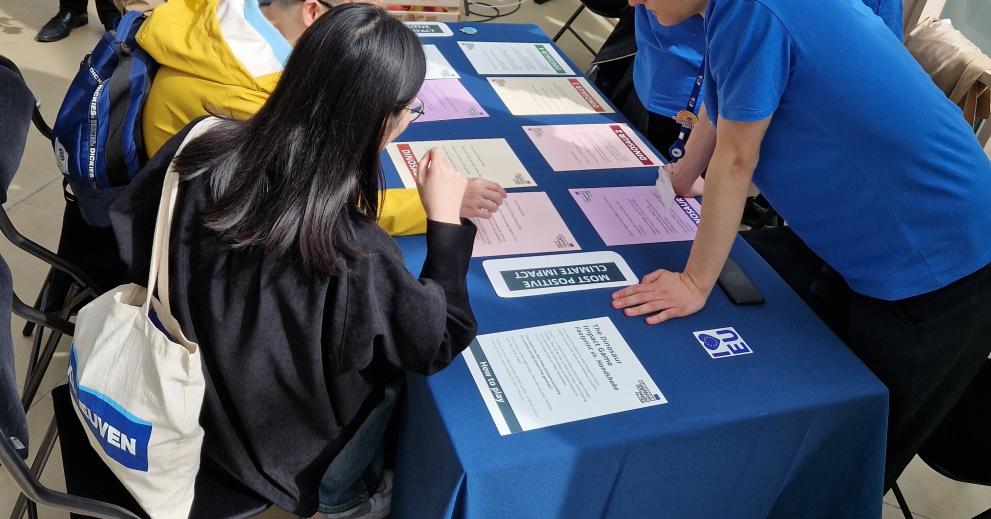
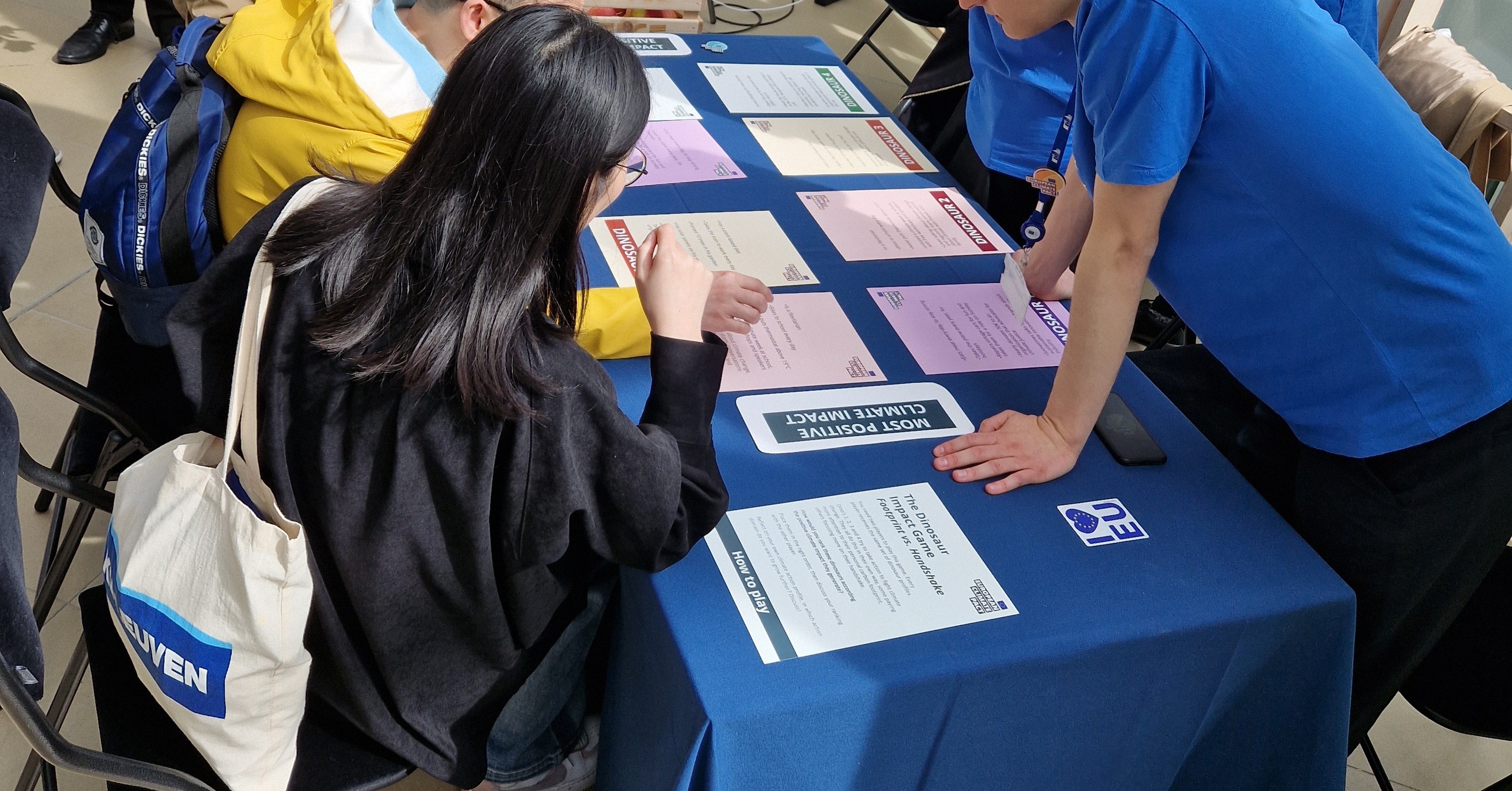
The Dinosaur Game was a success in starting up interesting discussions on the climate impact of daily activities, Brussels, 4 May 2024The Dinosaur Game was a success in starting up interesting discussions on the climate impact of daily activities, Brussels, 4 May 2024 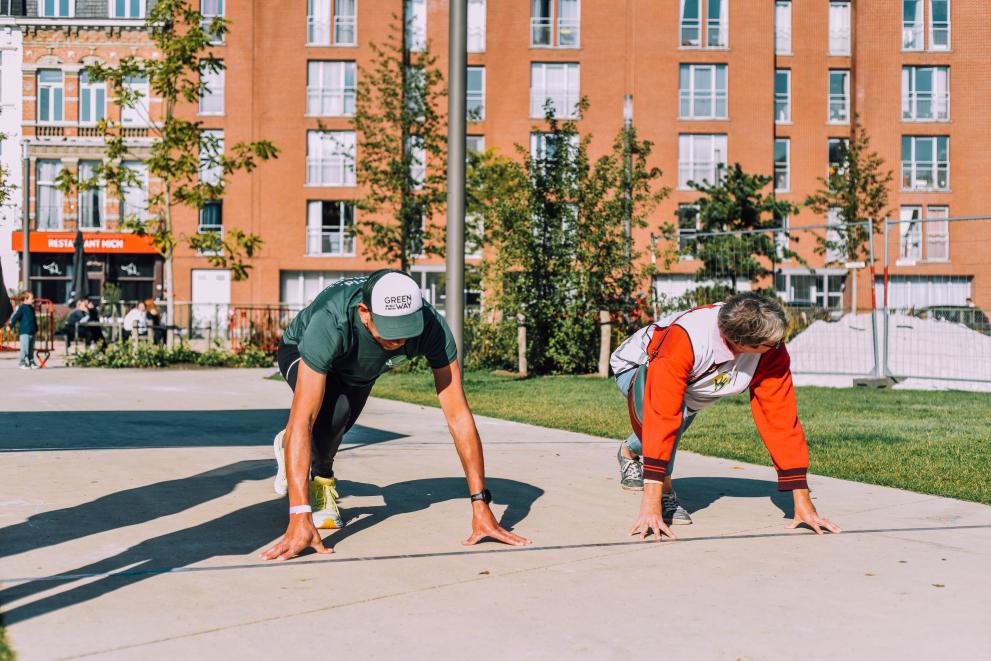
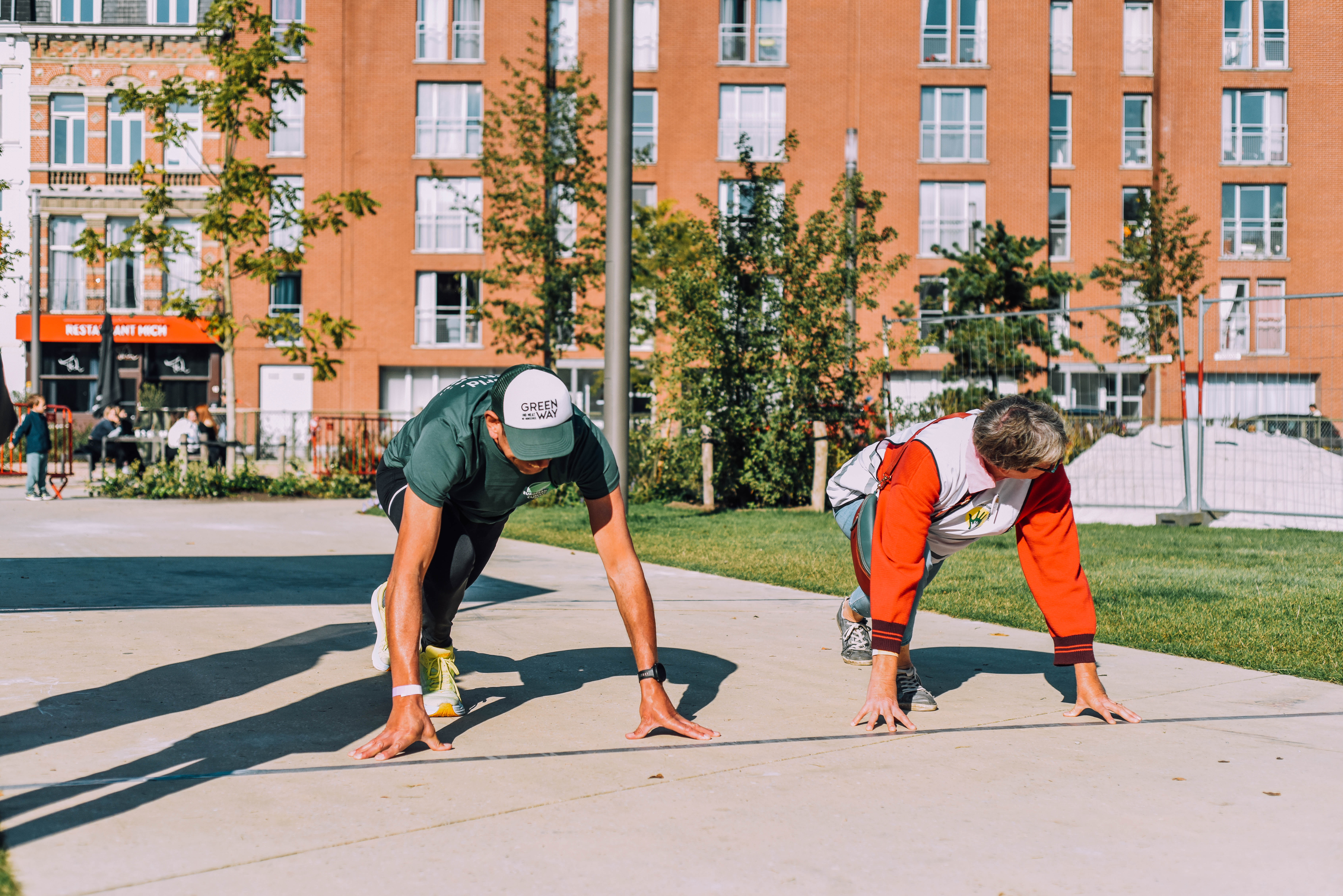
Get set, go! In position for the Climate relay race, hosted by EU Climate Pact Belgium and Grootouders voor het Klimaat, Antwerp, Belgium, 5 October 2024Get set, go! In position for the Climate relay race, hosted by EU Climate Pact Belgium and Grootouders voor het Klimaat, Antwerp, Belgium, 5 October 2024
- Before
- Select the game from the list below and check out the specific requirements.
- Select a time and location for your activity, keeping in mind the requirements for each of the games and an appropriate setting (indoor/outdoor).
- Consider partnering up with local associations (sports centres, youth organisations, climate activists, shops stocking sustainable products, etc.) to increase the reach of your activity.
- If you would like to offer a prize, seek possible partnership/sponsorship from a local business that sells organic and sustainable products (e.g. usable water bottles or shopping bags made with recycled material, flower seeds, a pot of aromatic herbs, etc.)
- Register as a host.
- Promote your activity with any partners.
- During
- Introduce yourself and the European Climate Pact.
- Explain the rules of the activity and make sure all participants have the materials required. Also provide a brief explanation of the climate background of the game.
- Begin the activity – don't forget to set a limited number of rounds/attempts per player or team or a maximum time limit, so that participants have a clear idea of the length of the game.
- Try to initiate a conversation on the climate content of the game, sharing interesting information and engaging with the participants based on their ideas and questions.
- At the end of the game, ask the participants to share what they have learnt.
- Conclude by thanking the participants. If they agree, take a group picture. If you would like to share the picture with the Climate Pact, please ask the participants to sign the consent form linked in the resources below.
- After
- Share the results of your activity with the Climate Pact.
- Stay in touch and engage with the participants beyond the activity.
Engage in a full-body workout while performing eco-friendly actions and learning about the impact of climate change. Set up several workout stations, each with a specific exercise and an eco-friendly task or educational component. Here are a few examples:
- Tree pose and tree planting: participants hold the tree pose for one minute on each leg to build balance and core strength. Next, they plant a small tree or flower symbolising their commitment to reducing their carbon footprint.
- Push-ups and plastic pickup: participants perform five push-ups before picking up five pieces of litter, focusing on plastic waste.
- Squats and sustainability pledge: participants do 10 squats and write down or share one new sustainable habit they will adopt, such as reducing water use or biking instead of driving.
- Jogging/obstacle course race and water saving: each participant/team receives an identical open container filled with an equal amount of water and must carry it to a water storage tank, highlighting the importance of water storage to help us overcome droughts. Everyone starts at the same time, navigating a designated course, which can be either flat or filled with obstacles. The winning participant/team is the one that finishes the fastest while retaining the most water in their container/adding the most water to the storage tank.
- Materials needed: This depends on the stations (e.g. seeds to plant, bags and gloves to collect litter, water containers, etc.).
- Budget: Low
- Outdoor/indoor: Outdoor
- Participants: Depending on the type of exercise, suitable for all ages. Can be set up for individual participation or for teams. Group size varies according to the type of event and number of supervisors.
- Length: 30–60 min
In advance, prepare bingo cards with examples of climate-friendly activities. During the game, the host reads out the activities in a random order, while participants cross out the corresponding square if they or their family have done the environmentally friendly activity. The person who gets five squares in a row, column or diagonal and shouts ‘BINGO’ wins. This game can also be played individually, with each participant simply reading the card and crossing out the activities that they or their family have done.
- Materials needed: Printed bingo cards – download the sample bingo card and list of activities (available in English, French and Dutch) to read out and create your own additional bingo cards – the AWorld app can provide inspiration on additional climate-friendly daily activities.
- Budget: Free
- Outdoor/indoor: Suitable for both outdoor and indoor
- Participants: Individual players aged 6+, scalable for big events
- Length: Max 10 min
A discussion-based game where players take on four different dinosaur profiles, each representing a unique set of actions that affect the climate in both positive and negative ways. The goal is to analyse and debate which dinosaur has the most significant positive impact on the environment. Players must first rank the dinosaurs based on their overall climate impact, then compare their ranking with that given by the opposing team or player. The game encourages thoughtful discussion, as each dinosaur's actions include both ‘footprint’ (negative impact) and ‘handshake’ (positive impact) activities, leading to varied interpretations of the ‘correct’ ranking.
- Materials needed: Printed cards – download the instructions and playing cards
- Budget: Low
- Outdoor/indoor: Suitable for both outdoor and indoor
- Participants: Small groups (1 to 4 players) form two teams that debate with each other for one short round. Suitable for participants aged 16+
- Length: Short rounds of up to 10 minutes each
A climate quiz is a fun way to learn about the climate and environment. To prepare for hosting the game, first select topics and themes based on the age/expertise of your participants. Choose various themes related to climate and the environment, such as energy efficiency, renewable energy, pollution and waste management, greenhouse emissions and EU climate policies. Prepare a set of questions for each category, ranging from easy to difficult. Questions can be either multiple choice or true/false. Determine how points are awarded for correct answers and whether there are bonuses for speed or streaks.
- Materials needed: Paper cards with the questions and a whiteboard to keep the score. For a list of questions and answers, take the climate quizzes developed by the European Commission for kids (children aged 9-12) and for adults or download a list of sample questions and answers
- Budget: Low
- Outdoor/indoor: Suitable for both outdoor and indoor
- Participants: Depending on the type of questions, suitable for age 13+. Group size can vary from one player to a large number of players who can take part individually or in teams.
- Length: 15-45 minutes
The European Commission has developed a climate action board game for children aged 9 to 12. In this game, participants throw the dice and advance on the board. The first one arriving at the end wins.
- Materials needed: Game board (downloadable for free), a dice and pegs
- Budget: Free
- Outdoor/indoor: Suitable for both outdoor and indoor
- Participants: Suitable for small groups (max 6 players), participants aged 9-12
- Length: 15-45 minutes, depending on the number of participants
Whether you are a student or an energy enthusiast, RECxploration will strengthen energy literacy and provide knowledge needed to navigate the evolving landscape of the energy transition. The players take on the role of an energy community member and, over the course of three rounds, are asked to make smart energy-saving decisions. Their final score will be based on the choices made during the game.
- Materials needed: Laptop/tablet or mobile phone with Internet connection
- Budget: Free
- Outdoor/indoor: Indoor
- Participants: Individual players, participants aged 16+
- Length: 20-30 minutes
Climate Fresk is a collaborative workshop game that helps participants understand the complex dynamics of climate change through an engaging, hands-on experience. The game is structured around a set of cards that represent various aspects of the climate system, including greenhouse gases, climate impacts, and feedback loops. Participants work together to arrange the cards and create a visual ‘fresk’ (mural) that illustrates the interconnected causes and effects of climate change. Through guided discussion and reflection, players gain insights into the causes of climate change, its global consequences and potential solutions. The game must be facilitated by a trained Climate Fresk facilitator - proper facilitation is essential to avoid feelings of powerlessness at the end of the workshop and to motivate and empower participants to take action.
- Materials needed: Climate Fresk cards, a table, 2x2 paper roll, markers, pens or crayons, post-it notes
- Budget: Cost of the game. Facilitator's training. Free non-commercial use only applies in some circumstances – see the user license for the terms that may apply to you
- Outdoor/indoor: Indoor
- Participants: Individual players, participants aged 16+
- Length: 3 hours
The online video game Climate Survivors features a long list of climate mitigation and adaptation options that players can activate to ‘battle’ climate hazards. These choices affect a climate model running in the background of the game. The final score depends on the global warming they manage to avoid. A free demo is available upon download of the gaming platform Steam, which is also free.
- Materials needed: Laptop and internet connection - it is advisable to download and create an account on the platform Steam before the session. The demo is available in English only.
- Budget: Free
- Outdoor/indoor: Indoor
- Participants: Individual game, participants aged 16+. Groups of players can take turns and compete for the highest score.
- Length: Short rounds of 10 minutes
Tips
- Try to keep the game short. It will be more effective and easier to implement, especially in crowded and busy venues.
- Don't hesitate to adapt the games to suit your event and participants.
- Some games, such as the Climate Quiz or the Climate Workout, could become a fun recurrent activity to be carried out weekly/monthly with a final prize at the end.
- Bring people from different ages and backgrounds together. The more diverse the group of participants, the more interesting the discussion is and the more unexpected the outcome of the game!
Example(s) of implementation
- France - The Pact's French Country Coordinator successfully organised a ‘Climate Workout’ and noted that: "raising awareness of climate change through sport is a unifying theme that is accessible to all" and that the game encouraged talking about the Pact “in a fun, positive and guilt-free way".
- Poland - The Pact's Country Coordinator in Poland developed and hosted a game of Climate Bingo at the Beskid Good Energy Festival which attracted more than 1,000 participants. Organised by the Bielsko-Biała Energy Management Office, this annual event promotes energy conservation and environmental protection.
"Climate Bingo was a significant hit, proving to be an excellent engagement tool. The participants enjoyed the game, which facilitated interaction and learning in an entertaining format." Dorota Guzik, European Climate Pact Country Coordinator in Poland
Showcase the results and encourage others to scale-up!
- Encourage participants to take pictures during the activity, share them on social media and tag #EUClimatePact and #MyWorldOurPlanet
Suggestions to continue ongoing engagement
- Invite participants to use UN Act Now – AWorld app to reduce their carbon footprint through daily activities such as walking and cycling or reducing food waste.
- Explore other Climate Pact tools and resources to engage your network and community in additional activities.

